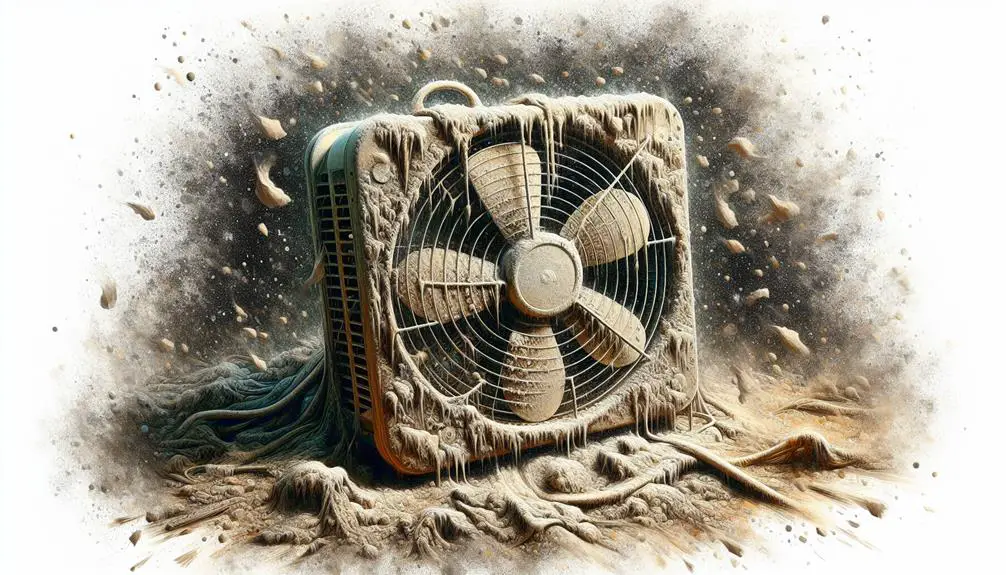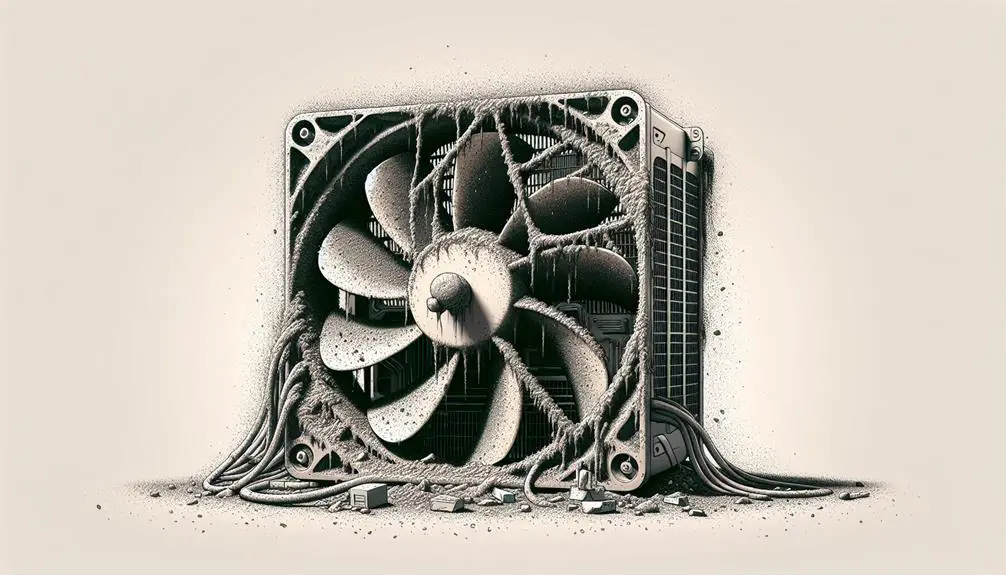- The loudness of your cooling fan can be due to dust accumulation.
- It can also be caused by mechanical wear and tear.
- Additionally, obstructions in the fan blades may contribute to the noise.
This noise can be bothersome and may indicate that maintenance is needed to prevent further damage to the fan or other components in the system.
Accumulation of Dust and Debris

Dust and debris buildup can greatly hinder your cooling fan's performance, making it louder over time. You're likely familiar with the gentle hum of a well-functioning fan, but when layers of dust and tiny particles start accumulating, they disrupt airflow and force the fan to work harder. This extra effort isn't just a strain on the system; it's a direct cause of the increased noise you're hearing.
What's happening is that the dust isn't merely sitting idly. It's actively interfering with the fan blades' smooth rotation and obstructing the air paths, making your fan struggle to maintain its usual pace. The noise level escalates as the fan attempts to compensate for these obstructions, leading to an annoyingly loud operation that can disrupt your peace.
You mightn't notice the buildup at foremost, as it happens gradually. However, once you realize the connection between the cleanliness of your fan and its operational noise, you're on the right track to solving the problem. Regular cleaning becomes crucial, not just for maintaining a quiet environment but for ensuring the longevity and efficiency of your cooling fan. Don't let a little dust stand in the way of your comfort and your fan's best performance.
Mechanical Wear and Tear
Beyond cleaning off dust and debris, addressing mechanical wear and tear can also greatly quiet a noisy cooling fan. Over time, your fan's moving parts can wear down, leading to increased noise levels. Bearings, which allow the fan to spin smoothly, can become worn or dry out, causing a grinding or whirring sound. You mightn't think about it, but even the smallest amount of wear can have a big impact on noise.
Lubricating these parts can sometimes reduce the noise, but it's often a temporary fix. If you're hearing persistent loud noises, it might be time to replace the worn components. The fan's motor is another common culprit. With age, the motor can struggle to operate as efficiently as it once did, leading to louder operation. This isn't just a nuisance; it can indicate your fan is working harder than it should be, potentially shortening its lifespan.
Don't overlook the impact of mechanical wear and tear. Regular maintenance checks can help identify issues early, but once parts are significantly worn, replacement is usually the best course of action to make sure your cooling fan runs quietly and efficiently.
Obstructions in Fan Blades

Another common reason your cooling fan might be louder than usual is if something's caught in the fan blades, blocking smooth rotation. This obstruction not only strains the fan motor but also disrupts the airflow, leading to increased noise. It's not just large objects you need to worry about; even small particles like dust, pet hair, or debris can accumulate over time, severely affecting the fan's performance.
To tackle this issue, you should first power off your device for safety. Then, visually inspect the fan blades for any visible signs of obstruction. If you spot anything, gently remove it without damaging the blades. In cases where dust and dirt are the culprits, using compressed air can be a quick and effective way to clear the fan blades. However, make sure you're using the compressed air correctly to avoid pushing the debris further into the fan assembly.
Routine maintenance is key to preventing obstructions in the first place. Regularly cleaning the fan and its surrounding area can significantly reduce the buildup of dust and debris, ensuring your cooling fan operates quietly and efficiently. Remember, a clean fan is a quiet fan.
Inadequate Ventilation
Your cooling fan's loud noise may also stem from inadequate ventilation, restricting its ability to expel hot air efficiently. When your device's ventilation isn't up to par, the fan has to work overtime. This not only leads to a notable increase in noise but can also shorten the lifespan of your fan by causing it to wear out faster.
Improper ventilation is a problem you shouldn't overlook. Here's what typically causes it:
- Blocked Air Vents: Make sure nothing is covering your device's air vents. Even something as thin as a piece of paper can obstruct airflow.
- Dust Accumulation: Over time, dust can build up inside the vents, further restricting airflow. Regular cleaning is vital.
- Improper Placement: Placing your device on a soft surface, like a bed or a couch, can block the vents. Always use it on a hard, flat surface.
- Tight Spaces: Operating your device in a cramped space can restrict air circulation around it. Make sure there's enough room for air to move freely.
Addressing these issues can significantly reduce the noise coming from your cooling fan by making sure it doesn't have to strain to keep your device cool.
Design and Manufacturing Flaws

While addressing ventilation issues can greatly quiet down a noisy cooling fan, manufacturing flaws in the fan's design might still cause persistent loudness. It's important to understand that even the best maintenance can't fully compensate for these intrinsic issues. Let's explore some common design and manufacturing flaws that could be making your cooling fan louder than it should be.
| Flaw | Impact | Solution |
|---|---|---|
| Imbalanced Blades | Increases vibration and noise | Seek professional rebalancing or replacement |
| Poor Bearing Quality | Leads to grinding or whirring sounds | Replace bearings with higher quality ones |
| Inadequate Casing Design | Allows sound to escape more easily | Use sound-dampening materials or upgrade fan |
| Faulty Motor | Can cause inconsistent fan speeds and noise | Repair or replace the motor |
| Tight Assembly Spaces | Restricts airflow, increasing operational noise | Ensure proper spacing for airflow around the fan |
Each of these flaws can contribute to the noise level of your cooling fan. If you've ruled out external factors like ventilation, it's worth examining these internal components. Sometimes, a simple replacement or adjustment can make a world of difference. Remember, addressing these issues not only reduces noise but can improve the general performance and lifespan of your cooling fan.
Conclusion
Essential, your cooling fan's loudness can stem from several issues. Dust buildup, mechanical wear, obstructions, poor ventilation, or design flaws all contribute.
It's vital to regularly clean your fan, make sure it's not blocked, and check for signs of wear.
If the problem persists, it might be a manufacturing flaw. Addressing these factors can greatly reduce noise, improving your device's performance and your overall experience.
Remember, a quiet fan often means a happy device.